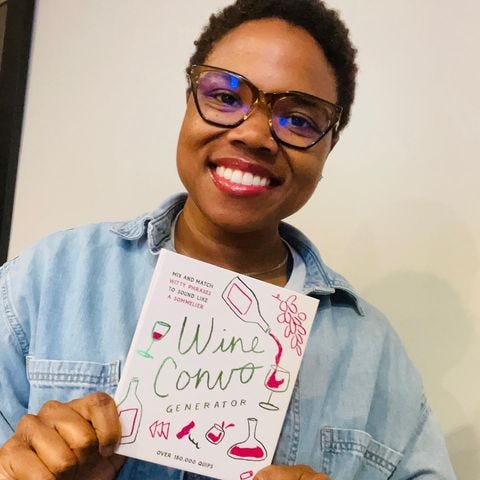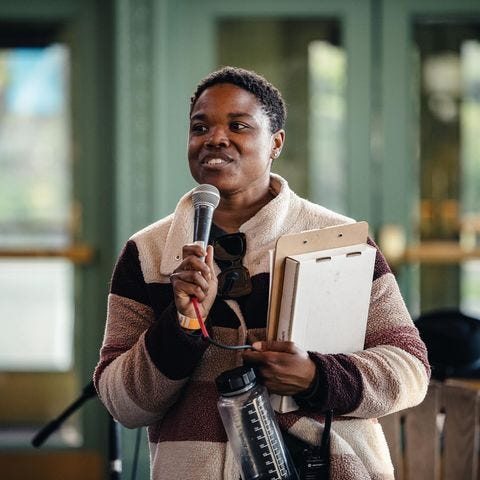Welcome to the Tuesday post for all subscribers, an interview with a wine educator, writer, and all-around amazing human, Chasity Cooper. I have learned (and continue to learn!) so much from her, and I know you will too. On Friday, paid subscribers will receive a recipe for coffee cake. As always, learn more about my work here.
Chasity Cooper is a wine writer, educator, and wine culture expert in Chicago, IL. She got her start in wine after falling in love with it on a study abroad trip and watching Scandal in 2012. She has been writing about wine in publications including Chicago Reader, Eater Chicago, Wine Enthusiast, and Imbibe Magazine since 2016, and currently a candidate for the DipWSET. She is also the author of Wine Convo Generator: Mix and Match Witty Phrases to Sound like a Sommelier, which was published this spring by Chronicle Books.
Laura Scherb: So, you wrote a book!
Chasity Cooper: Yes! So I was approached by the publisher and they have the premise for the book. And they needed somebody to write these wine notes. And I was like, yeah, I guess I could I could do that. It was a great exercise because it allowed for me to take the wine speech that I'm used to, and my experiences being around different people in the industry, and then make it more accessible and, dare I say, pedestrian, but usable for everybody, whether you drink Yellowtail or you're pulling out the big bucks for Caymus or Opus One. Wherever you are in your wine journey, this book is an opportunity for you to get better acquainted with how to talk about wine.
LS: I mean, it does exactly that! So, tell me about the process of writing this. How did you go about pulling together? Some of these words are wine words that you would expect, but then some of them are so creative and offbeat. So talk to me about that.
CC: Thank you. I really appreciate this conversation right now. Because if I'm being completely honest, I've had a bit of a moment in the last couple of weeks whether or not I'm going to continue this journey of wine writing, and so talking about this is helpful. It's one of those thankless jobs to write about wine. You do it because you love what's coming out of the ground. You love what people are producing. You love the community and camaraderie that it brings.
And so I think for me, the process to write this was one of taking a step back and thinking about what experiences I’ve had where I've had to describe wine and talk about it. It was going through notebooks, notes on my phone, figuring out okay how I was talking about wine on my travels. So I'm grateful that I had that library of experience, of travel, or even of tastings here in Chicago, to be able to be very present when I am with wine. So those experiences, those many notes, helped me write.
LS: That’s amazing.
CC: It was fun. It was fun to sit and reflect. I don't give myself the chance to do that. But it was also like, ooh, people are gonna start talking about wine and feeling confident and comfortable and not afraid to use certain words that they may have felt as been out of their league.
LS: Truly, I feel that they couldn't have picked a better person to write this because having taken your classes and read your work on wine, you are someone who takes something that is so intimidating and exclusive, and you've just made it very welcoming and open. And you know, I think a lot of people, even if they don't know how to talk about wine, they could still articulate what you articulate in the book, which is so cool and so unique.
CC: Thank you, I really appreciate that. And honestly, that when I have a moment to sit and reflect, that’s why I do this: it's really just to give people the agency and the opportunity to talk about wine and to feel comfortable and not feel intimidated by it. Because like you said, it is a very exclusive, and it feels out of reach for a lot of people in 2024. You would think after especially the last decade or so, we're we've seen so many different types of people come into the industry and be trailblazers, and you know, just break barriers in such an exclusive space that even myself after being in this industry for you know, over five years, I'm still like, like, what's going on? Like, how can I continue to find carve out that space, so everybody can come along?
LS: I love it. I mean, it's an interesting space, too, because through people like you I have gotten to know very cool producers who are doing very cutting edge, new things and who are expanding the field. But then I also keep reading that people our age are not drinking wine the way that they have in the past. So what is your feeling about that tension there?
CC: Oh gosh. Everybody has a different entry point [to wine]. So I think the tension now is, well, are millennials going to be the ones that collect wine? Are they going to be the ones to often travel to Napa and become those members of those wine clubs? I think it's just a matter of the wine industry not taking themselves so seriously and recognizing that every generation is going to have a different entry point to this. It’s fermented grape juice. It's been around since forever. And so I think as professionals and as an industry, we have to just kind of let go a little bit and just allow people to enter and engage with it the way they want to.
LS: I mean, amen. That is it. That's how the wine industry is going to survive and thrive. Tell me about some of the things that are happening like in the wine world right now that are really interesting to you that you think, you know, you'd like to share with people as an entry point.
CC: Yeah, I think for me, and there's a number of things. So one, the way wine is marketed. I'm constantly looking at how are these wine brands talking to consumers? Another thing also that I continue to keep an eye on is just how the environment continues to change and what that means for us as consumers. And another thing that I'm always thinking about is just general accessibility. Where are people picking up their wine? Where are they learning about it? Are they feeling comfortable and just walking into a Binny’s or wine shop and ask them questions? And also I’m thinking about accessibility for the producer, like how do they navigate the three tiered system here in the United States?
LS: Can you just tell us what the three tiered system is?
CC: So the three tiers here in the United States are the producer, the wholesaler, and the retailer. So, let's say you and I made a wine in Italy, and we want to break into the American market. Before that wine even makes its appearance or debut in the United States, we would have to come over here and find a wholesaler–or someone to distribute our wine. That's the level I've heard is hard for producers to break into–unless you're part of a big distribution company. Being able to foster those relationships is really what makes it important for the smaller and medium-sized producers to come and thrive whether they are in Italy, or they're here in the United States. And then when you get to the retailer level, they ultimately make the decision on what to carry in their store. It truly is a game with so many layers and levels to it. And I think it's easy for the consumer not to think about it, and just go to the wine shop and buy their favorite wine.
LS: Oh, my gosh, absolutely. We're so lucky as consumers to just be able to go grab a bottle of wine and not have to think twice about it. But I feel like the further into this world you get and the more you do the wine tourism stuff, you start to realize that it is so complicated, and that system affects the choice that you as a consumer have in your wine store. So I love that that's something that you're thinking about. Who do you want to shout out in Chicago in the wine scene?
CC: Oh my gosh, everybody. I want to shout out a number of people I definitely want to shout out friends of mine people like Vernon Jackson, Regine Rousseau, Derrick Westbrook, Zack Eastman, who's over at Easy Does It. Deep Red Wine Merchants, who celebrated their six months anniversary a couple of weeks ago. Bronzeville Winery, where my book is actually on the counter. Pops for Champagne celebrated their 40th anniversary recently. Webster's, The Wine Goddess up here in Evanston. BottlesUp.
I mean, I could go on and on. I think in this city is so amazing at what they do, and they create communities within what they're doing. Melissa obviously does an incredible job at the classes and the community that she brings together. Same with Diana and Meg at The Wine Goddess.
And also, Tia Polite is the sommelier at Indienne. I had dinner there a couple of weeks ago, and not only was she lovely, but the wines just paired so well with everything I had. And it was truly an amazing experience.
Chicago is such a beautiful city for so many reasons. Of course, we have an incredible food scene that is constantly changing. But also there are so many opportunities here to enjoy good wine. Everybody needs their favorite local wine bar where you can go and everybody knows your name, and they know what you like. All those people are doing just incredible work. And it's fun to see people out and enjoying themselves and doing the work that they love.
LS: I mean, yes. 100% and I love ending on that note. It's always such a pleasure to just hear you talk about wine. You are someone who I consider an expert but a very accessible expert, and I can't tell you how much that means to someone like me who likes to drink wine but wants to understand more about it. So thank you.
CC: Thank you. That means a lot truly. I love being a Chicago wine ambassador. So yeah, if anybody has questions, feel free to hit me up on social email and I'm happy to answer and be of help.
Follow Chasity on social media here, and subscribe to her amazing newsletter here. Don’t forget to grab a copy of her book, too!









An absolutely lovely interview with a fantastic wine writer about our city's wine scene. I love baking, but I am deeply nerdy about wine, too.
Appreciate you always, Laura!